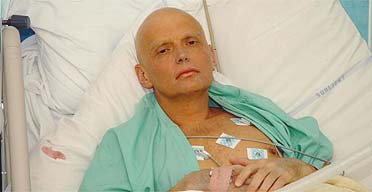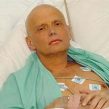
WAS LITVINENKO THE LATEST VICTIM OF A KREMLIN POWER STRUGGLE?
Publication: Eurasia Daily Monitor Volume: 3 Issue: 218
By:

The death of former Federal Security Service (FSB) lieutenant colonel Alexander Litvinenko in London on November 23, and the subsequent release of his statement blaming his poisoning on President Vladimir Putin, has morphed into a serious international scandal. British Home Secretary John Reid said on November 26 that police, who were previously calling Litvinenko’s death “unexplained,” now regarded it as “suspicious” (Press Association, November 26). This followed the revelation that Litvinenko had been poisoned with polonium 210, a radioactive substance. Meanwhile, Peter Hain, the Northern Ireland secretary, said in a BBC interview that there have been “huge attacks on individual liberty and on democracy” under Putin, and pointed specifically to the “extremely murky murder of a senior Russian journalist” – an apparent reference to the October 7 killing of Anna Politkovskaya (FT.com, November 26; News.scotsman.com, November 27).
Putin, for his part, said on November 24 that Litvinenko’s deathbed accusation was a “political provocation” by Kremlin opponents. The Russian president, who was in Helsinki for the EU-Russia Summit, denied any involvement in the murder and offered condolences for Litvinenko’s death (Associated Press, November 24). Sergei Yastrzhembsky, Putin’s aide for EU relations, said in Helsinki: “I am hardly someone who believes in conspiracy theories, but in this case I think that we are witnessing a well-rehearsed plan to discredit Russia and its leader.” Meanwhile, Russian state media have highlighted speculation that Litvinenko’s ally and employer Boris Berezovsky was behind the murder. The government newspaper Rossiiskaya gazeta speculated that the London-based exiled tycoon “masked the crime to bring suspicion on the FSB” or that Berezovsky’s associates killed Litvinenko as a warning related to a commercial dispute (Moscow Times, November 27). Before Litvinenko died, Alexei Mukhin, director of the Center for Political Information in Moscow, also said the poisoning could have been part of an “information war on the Kremlin” organized by Berezovsky and even suggested Litvinenko had poisoned himself (Guardian, November 20).
Other observers, however, have suggested that Litvinenko was targeted as part of a power struggle between Kremlin factions. Some analysts said the same thing about Anna Politkovskaya’s murder (Chechnya Weekly, October 12; EDM, October 23). During the November 26 broadcast of “Rossiiskaya Panorama,” a weekly political discussion program broadcast on RTVi (a satellite channel owned by the exiled oligarch Vladimir Gusinsky), Iosif Diskin, deputy chairman of the National Strategy Center, said he thought the murders of Litvinenko, Politkovskaya, and Central Bank First Deputy Chairman Andrei Kozlov (who was gunned down in Moscow on September 14) were linked, “coordinated,” and aimed at forcing Putin “to act in a certain way – namely, either to enter into negotiations with a certain group on the subject of the choice of a successor, or really to force him … to remain for a third term.” Diskin added: “But, at the same time, I am deeply convinced that these are people, who now, [while] having maintained strong links to the special services, no longer belong to them formally.” This group, said Diskin, is bent on “changing the political course” because it “strongly fears for its future in a post-Putin era.”
Andrei Piontkovsky, director of the Center for Strategic Research in Moscow, told the BBC: “The death of Litvinenko — and we already see this in the reaction of the British press – is a colossal blow to the reputation of Russia and the personal reputation of Putin, who can hardly be interested in that. I am inclined to believe that not only the poisoning of Litvinenko, but also the whole series of recent events in Moscow, are part of an operation to destabilize the situation and completely discredit Putin in the West in order to persuade him to go for a third term, which is the goal of influential circles within his entourage” (Kavazky Uzel, November 24). In a separate commentary, Piontkovsky speculated that Politkovskaya, Litvinenko, and Chechen special forces commander Movladi Baisarov, who was killed in Moscow on November 18 (Chechnya Weekly, November 22), were murdered by a renegade “structure inside the special services that is conducting a deadly fight for power in the Kremlin” (Grani.ru, November 25).
Similarly, Alexander Golts of Ezhednevny zhurnal wrote that it is “more than doubtful that Putin himself gave the order for Litvinenko’s liquidation,” given that “the harm this whole story has done to the Russian president’s reputation is too obvious.” On the other hand, some of Putin’s close associates — “officers of the special services” — for whom Putin remaining for a third term is “a matter of life in death,” had a motive to kill Litvinenko, wrote Golts. “And for this it is necessary to create a situation that would completely exclude the possibility of Putin joining the informal club of retired leaders who cheerfully travel the world, give lectures, enjoy life,” Golts wrote. “For Putin to stay on, it is necessary to bind him with blood … So it is necessary to leave as many obvious footprints leading to Russia as possible. For that, radioactive material is the most appropriate murder weapon” (EJ.ru, November 26).
It should be noted that one leading analyst, erstwhile Kremlin insider Stanislav Belkovsky, put forward an alternative version — that Litvinenko’s poisoning was, as the Moscow Times summarized Belkovsky’s theory, “an attempt by supporters of Dmitry Medvedev, the first deputy prime minister, to force Putin to push aside the siloviki by making it look like they were involved in an attack that had damaged Putin’s image in the West” (Moscow Times, November 27). Indeed, another newspaper quoted Belkovsky as saying the murder was “a deliberate provocation by the special services against its leadership with the intention of convincing Putin to fire the current heads of the federal power structures and as quickly as possible” determine who his successor will be (Novye izvestiya, November 27).
Yet even Boris Berezovsky indicated he thought that those pushing Putin to remain in power were behind Litvinenko’s murder. On November 22, one day before Litvinenko died, Berezovsky told Ekho Moskvy radio that while the Kremlin “unquestionably” stood behind the poisoning, the idea that Putin participated in it “raises many questions” and the incident “undoubtedly hurts Putin’s reputation.” Berezovsky added: “I have the impression that it is being done by people who are insisting that he [Putin] goes for a third term; people who are showing that he is not the only one who makes decisions of this kind in Russia.” The attempt on Litvinenko’s life and the murder of Anna Politkovskaya, said Berezovsky, were “links in the same chain” (Chechnya Weekly, November 22).




